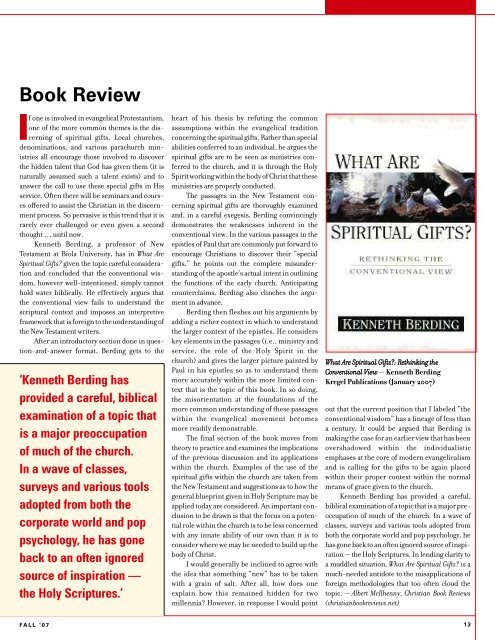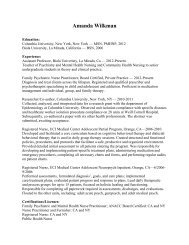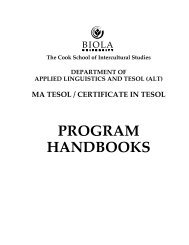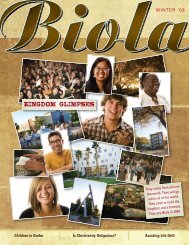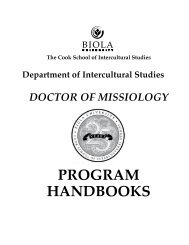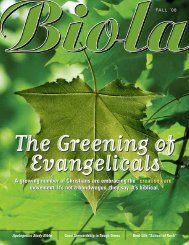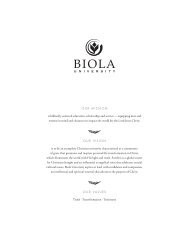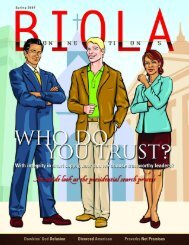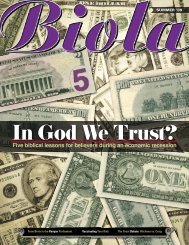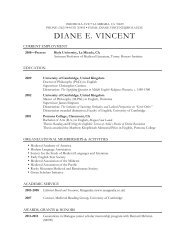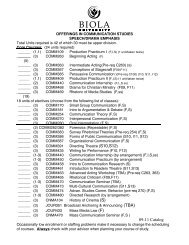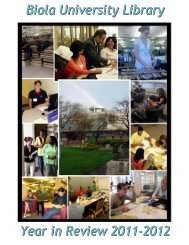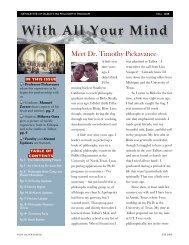New President, New Century New President, New ... - Biola University
New President, New Century New President, New ... - Biola University
New President, New Century New President, New ... - Biola University
Create successful ePaper yourself
Turn your PDF publications into a flip-book with our unique Google optimized e-Paper software.
Book Review<br />
If one is involved in evangelical Protestantism,<br />
one of the more common themes is the discerning<br />
of spiritual gifts. Local churches,<br />
denominations, and various parachurch ministries<br />
all encourage those involved to discover<br />
the hidden talent that God has given them (it is<br />
naturally assumed such a talent exists) and to<br />
answer the call to use these special gifts in His<br />
service. Often there will be seminars and courses<br />
offered to assist the Christian in the discernment<br />
process. So pervasive is this trend that it is<br />
rarely ever challenged or even given a second<br />
thought … until now.<br />
Kenneth Berding, a professor of <strong>New</strong><br />
Testament at <strong>Biola</strong> <strong>University</strong>, has in What Are<br />
Spiritual Gifts? given the topic careful consideration<br />
and concluded that the conventional wisdom,<br />
however well-intentioned, simply cannot<br />
hold water biblically. He effectively argues that<br />
the conventional view fails to understand the<br />
scriptural context and imposes an interpretive<br />
framework that is foreign to the understanding of<br />
the <strong>New</strong> Testament writers.<br />
After an introductory section done in question-and-answer<br />
format, Berding gets to the<br />
‘Kenneth Berding has<br />
provided a careful, biblical<br />
examination of a topic that<br />
is a major preoccupation<br />
of much of the church.<br />
In a wave of classes,<br />
surveys and various tools<br />
adopted from both the<br />
corporate world and pop<br />
psychology, he has gone<br />
back to an often ignored<br />
source of inspiration —<br />
the Holy Scriptures.’<br />
heart of his thesis by refuting the common<br />
assumptions within the evangelical tradition<br />
concerning the spiritual gifts. Rather than special<br />
abilities conferred to an individual, he argues the<br />
spiritual gifts are to be seen as ministries conferred<br />
to the church, and it is through the Holy<br />
Spirit working within the body of Christ that these<br />
ministries are properly conducted.<br />
The passages in the <strong>New</strong> Testament concerning<br />
spiritual gifts are thoroughly examined<br />
and, in a careful exegesis, Berding convincingly<br />
demonstrates the weaknesses inherent in the<br />
conventional view. In the various passages in the<br />
epistles of Paul that are commonly put forward to<br />
encourage Christians to discover their “special<br />
gifts,” he points out the complete misunderstanding<br />
of the apostle’s actual intent in outlining<br />
the functions of the early church. Anticipating<br />
counterclaims, Berding also clinches the argument<br />
in advance.<br />
Berding then fleshes out his arguments by<br />
adding a richer context in which to understand<br />
the larger context of the epistles. He considers<br />
key elements in the passages (i.e., ministry and<br />
service, the role of the Holy Spirit in the<br />
church) and gives the larger picture painted by<br />
Paul in his epistles so as to understand them<br />
more accurately within the more limited context<br />
that is the topic of this book. In so doing,<br />
the misorientation at the foundations of the<br />
more common understanding of these passages<br />
within the evangelical movement becomes<br />
more readily demonstrable.<br />
The final section of the book moves from<br />
theory to practice and examines the implications<br />
of the previous discussion and its applications<br />
within the church. Examples of the use of the<br />
spiritual gifts within the church are taken from<br />
the <strong>New</strong> Testament and suggestions as to how the<br />
general blueprint given in Holy Scripture may be<br />
applied today are considered. An important conclusion<br />
to be drawn is that the focus on a potential<br />
role within the church is to be less concerned<br />
with any innate ability of our own than it is to<br />
consider where we may be needed to build up the<br />
body of Christ.<br />
I would generally be inclined to agree with<br />
the idea that something “new” has to be taken<br />
with a grain of salt. After all, how does one<br />
explain how this remained hidden for two<br />
millennia? However, in response I would point<br />
What Are Spiritual Gifts?: Rethinking the<br />
Conventional View — Kenneth Berding<br />
Kregel Publications (January 2007)<br />
out that the current position that I labeled “the<br />
conventional wisdom” has a lineage of less than<br />
a century. It could be argued that Berding is<br />
making the case for an earlier view that has been<br />
overshadowed within the individualistic<br />
emphases at the core of modern evangelicalism<br />
and is calling for the gifts to be again placed<br />
within their proper context within the normal<br />
means of grace given to the church.<br />
Kenneth Berding has provided a careful,<br />
biblical examination of a topic that is a major preoccupation<br />
of much of the church. In a wave of<br />
classes, surveys and various tools adopted from<br />
both the corporate world and pop psychology, he<br />
has gone back to an often ignored source of inspiration<br />
— the Holy Scriptures. In lending clarity to<br />
a muddled situation, What Are Spiritual Gifts? is a<br />
much-needed antidote to the misapplications of<br />
foreign methodologies that too often cloud the<br />
topic. — Albert McIlhenny, Christian Book Reviews<br />
(christianbookreviews.net)<br />
FALL ’07 13


